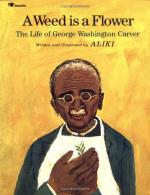|
This section contains 421 words (approx. 2 pages at 300 words per page) |

|
The conservationist agricultural practices developed by George Washington Carver at the beginning of the twentieth century increased agricultural sustainability for poor African-American farmers in the U.S. Deep South. An expert in revitalizing soil, Carver worked through the Tuskegee Institute in Alabama to publicize composting techniques and the importance of crop rotation, which helped combat soil depletion and pest infestation in the region's overcultivated cotton and tobacco fields.
Carver was born into slavery in Diamond Grove, Missouri, sometime between 1860 and 1864. His parents were lost to Confederate slave raiders. Formal education of blacks was not widespread, and only through his own tenacity did Carver become Iowa State's first African-American college graduate, earning a bachelor of science degree in 1894 and a master of science degree in 1896.
In 1896, Carver took a job at the Tuskegee...
|
This section contains 421 words (approx. 2 pages at 300 words per page) |

|


